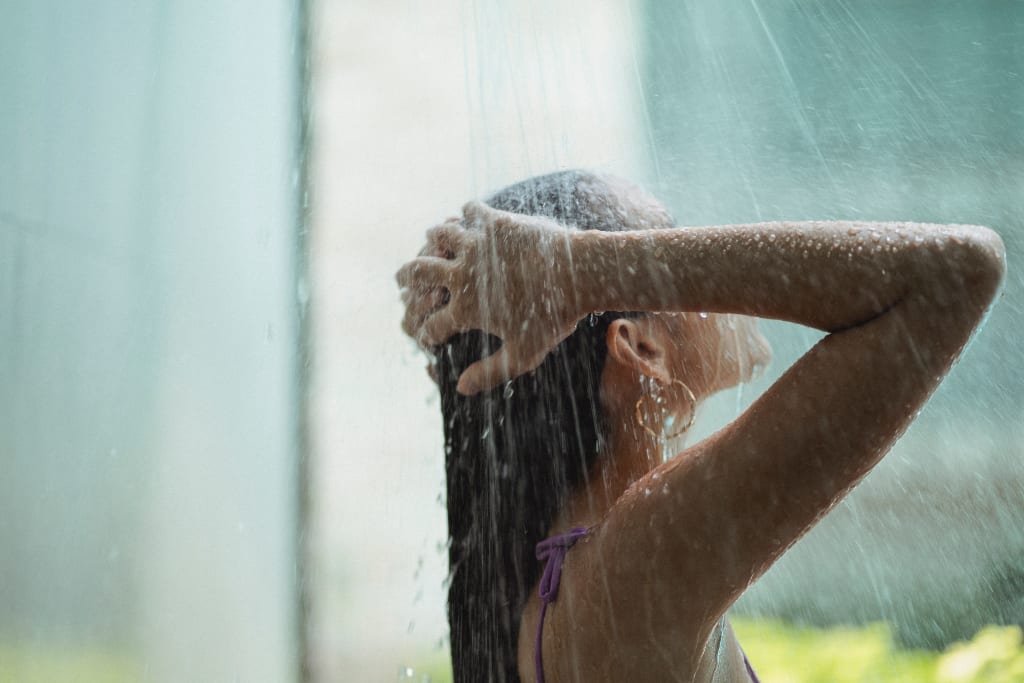How To Take Care of Your Hair on Low Poo Days
If you're looking for a way to care for your hair in a gentle way, low poo is the answer. It's not only an effective method but also fun and easy to do! You don't have to restrict yourself from shampooing every day or twice a week - just follow these tips and tricks that I've outlined below so you can have beautiful locks without hurting your scalp too much.

We all have days when we don't have the time or energy to wash our hair. That's why low poo is so great - it gives you all the benefits of a fresh shower without any of the work. But how do you go about taking care of your locks on those extra-busy days? Well, luckily for you, we've got everything you need to know about low poo in this post!
The biggest thing is to not shampoo as often.
The biggest thing is to not shampoo as often. This can be difficult, because no one likes the feeling of "dirty hair." But in reality, it's fine if your hair looks a little greasy every day or two. The scalp produces natural oils (called sebum) that moisturize and protect the hair shaft from drying out or becoming brittle. Shampooing too often will strip these oils away, making your scalp produce more oil to compensate - which then gets washed away again with even more shampooing!
The other thing you should do is pay attention to how often you need to wash after each time you exercise or sweat during a workout session. If it feels like there's no point in washing because your scalp stays sweaty for hours after a workout anyways, then consider skipping this step altogether until things calm down again.
You can massage your scalp with a little conditioner if you need to.
You can massage your scalp with a little conditioner if you need to. If you're washing your hair with soap, it's going to be dry and sensitive because it's stripped of its natural oils. The best way to get it back in shape is by massaging with conditioner so that the cells of your scalp have some sort of moisture again.
Massage gently, using only your fingertips instead of nails or other tools that might damage the skin on your head - you don't want to scratch yourself! Massage in small circles all over this section of your scalp (not just where hair grows). Work from top to bottom and side-to-side for about 30 seconds each time, repeating as necessary until all areas are covered evenly.
Do this once every day or two - or whenever it seems like necessary! Just make sure not too much product gets into other parts because then they'll start looking greasy too soon afterward."
Instead of washing, you can use a dry shampoo on the roots.
Another option for dealing with the roots of your hair is to use a dry shampoo. Dry shampoos are made up of different ingredients, but they're essentially meant to absorb excess oil in the scalp and roots so that you don't have to wash your hair as often. When applying dry shampoo, make sure you don't rub it into your scalp; instead, focus on just applying it on the hair closest to your head where most of the oil is concentrated. Also remember that a little goes a long way! Don't overdo it by using too much product or scrubbing too hard with your hands - it's better if you apply light strokes and let them sit for at least five minutes before brushing through gently.
Use less shampoo and focus on the roots.
On days when you're using shampoo, use a very small amount and focus it on the roots. "When you're not conditioning, you don't need to strip your hair," says Dr. Khorsandi. To avoid over-stripping your strands, don't scrub too hard - and if possible, try to lather only the root area instead of applying shampoo all over your head. This will help prevent dryness at the ends (where most people apply too much product).
Use a quarter-size dollop of shampoo for short hair and an egg-size dab for longer locks; this will allow enough product to work its magic but won't weigh down your locks with extra moisture that doesn't need it. If necessary, divide up that amount into two parts: one section at a time from roots to midlengths and another from midlengths through ends. This will ensure even distribution without weighing down any one part of your mane too much.
Also use your fingers to gently work conditioner through the ends.
You can also use your fingers to gently work conditioner through the ends of your hair. This will help ensure that the product is distributed evenly and that you aren't leaving any part of your hair dry or lacking in hydration.
If you have fine or thin hair, it is best to use a wide tooth comb to gently work conditioner through the ends of your hair. This will help spread the product more evenly and create a barrier between the scalp and environment that keeps moisture in longer than if you just applied it with your hands alone (which can sometimes be too much).
Don't scrub the scalp too hard or it can cause inflammation.
Be careful not to scrub the scalp too hard when washing your hair, as this can cause inflammation. Excessive scrubbing can also cause dandruff and hair loss, and it's generally best to avoid it altogether. To help you get through low poo days with minimal scalp damage, try a gentler approach:
- Use gentle shampoo once per week or less. You can use a clarifying shampoo on alternate days if you need to remove buildup from styling products or other dirt from your hair (but remember not to overdo this!).
- Moisturize daily with an oil blend made up of jojoba oil and coconut milk; coconut milk is moisturizing for all skin types but especially dry skin types like mine because it has anti-inflammatory properties.
Washing every other day is perfectly fine for most people.
Don't wash every day.
This is a simple one. If you have normal hair, washing it every day will not be necessary and can actually cause damage to your scalp and hair follicles. Washing daily can also dry out your scalp which leads to dandruff, split ends and breakage. If you want clean hair, try using a dry shampoo in between washes instead of washing every day!
Don't wash too much or too little.
Washing your hair more often than once a week will strip the natural oils from it making it so brittle that one stroke will cause breakage. On the other hand, not washing enough causes buildup which can lead to dandruff or even worse things like scalp infections if left untreated for too long!
You don't want to run the risk of stripping your hair of its natural oils.
You do not want to run the risk of stripping your hair of its natural oils. This can cause breakage and hair loss, which is why it's important to be careful about how often you wash your hair and what products you use when doing so.
- Don't wash too often. It's a good idea to give your scalp at least one day off between washes, especially if you have dry or damaged hair that needs time to repair itself after being stripped down by shampoo or conditioner.
- Avoid over-shampooing: Using too much shampoo can lead to dryness and breakage in some cases (especially if using sulfate-free cleansers). If possible, only apply enough product so that it lathers slightly; this will help preserve moisture in the strands without stripping them completely bare!
- Use conditioner sparingly: You don't want all those extra oils building up on top of each other - remember that "conditioner" actually means "conditions," not just stands for any type of moisturizer like lotion does! Plus there are lots of ways besides just applying from head down through ends that won't leave behind residue like traditional methods did (see below).
The more you care for it, the better it will look!
You should wash your hair regularly.
- How often you should wash your hair depends on your hair type, how long your hair is, and the kind of scalp you have.
For example: people with oily scalps will need to wash their hair more frequently than those with dry scalps. Those who have thick or coarse strands may also want to consider washing their manes more often so as not to weigh down their locks too much (which could make them appear limp). It's important to note that no matter what kind of scalp or length of mane you possess, the longer it gets, the more likely it is that dead skin cells will build up at the roots - and if left untreated, these can lead to breakage and damage over time!
It's important to wash your brushes and combs frequently so you don't transfer dirt and oil back onto your hair when styling.
It's important to wash your brushes and combs frequently so you don't transfer dirt and oil back onto your hair when styling.
If you're not careful, it's easy to miss the signs that say it's time to clean them. You could use a wet brush on dry hair, which can cause breakage in your strands as well as damage the bristles of a comb or brush. Your hair can also get tangled in dirty brushes, which can cause tangles and breakage when styling.
If you notice any discoloration or rust on the metal parts of your comb or brush (or if there's just an unpleasant smell), then those are good signs that it's time for a deep cleanse!
Low poo is a fun approach because it's easy and gentle on hair!
Low poo is a fun approach because it's easy and gentle on hair! If you've been wondering how to care for your low poo days, read on for some tips.
- Choose the right products for your needs. You can't expect the same results from all shampoos, so experiment with different brands (or even different product lines within one brand) to find what works best for you.
- Don't be afraid to try new things! Some people are loyal to their favorite brands, while others love trying new things every day. Either way, there's nothing wrong with changing things up once in a while - you never know when a new product will become your favorite!
Conclusion
If you're looking for a way to care for your hair in a gentle way, low poo is the answer. It's not only an effective method but also fun and easy to do! You don't have to restrict yourself from shampooing every day or twice a week - just follow these tips and tricks that I've outlined above so you can have beautiful locks without hurting your scalp too much.
About the Creator
Courtanae Heslop
Courtanae Heslop is a multi-genre writer and business owner.






Comments
There are no comments for this story
Be the first to respond and start the conversation.